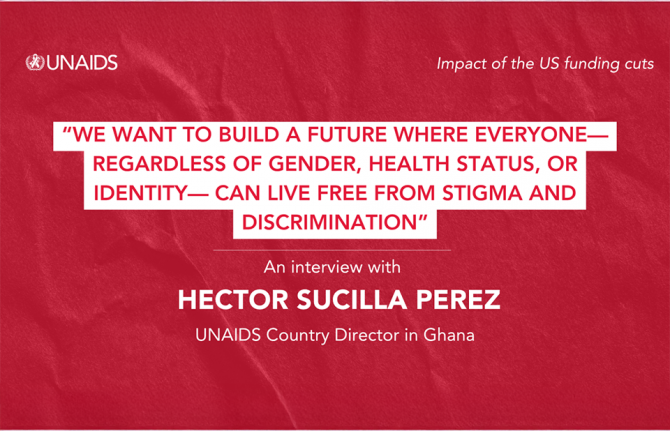

Feature Story
Impacts of U.S. pause of foreign assistance on global AIDS programmes in Botswana
09 February 2025
09 February 2025 09 February 2025Funding for the HIV Response in Botswana
Prior to the U.S pause of foreign assistance, the Government of Botswana funded two thirds of its HIV response (approximately US$ 90 - 95 M). The remaining costs were covered by the U.S. Government (US$ 55 M via the U.S. President’s Emergency Plan for AIDS Relief, PEPFAR, and US$ 12M via the Global Fund to Fight AIDS, Tuberculosis and Malaria).
Immediate Risks
The pause and stop order will:
- Undermine Botswana’s ability to fully achieve UNAIDS’ 95-95-95 targets and the efforts to finding the missing 5-2-2 in Botswana. That means reaching an additional five percent of all people living with HIV with testing so they are aware of their HIV status; ensuring that an additional two percent of all people who are living with HIV and are aware on treatment and ensuring an additional two percent of all those aware of their status and on treatment have their viral load suppressed.
- Take away safe spaces for key populations (KPs) and adolescent girls and young women (AGYW) and increase their vulnerability to HIV-related sigma and discrimination, gender-based violence, mental health problems and other related social ills.
- Reduce access to early diagnosis and treatment for HIV which leads to health complications and higher default rates for treatment adherence which correlates to a lack of viral suppression.
Impact on Civil Societies and Communities
In Botswana, the impact of the pause on U.S. foreign assistance and related stop order has already affected delivery of HIV prevention and treatment services by civil society organisations (CSOs) and will have implications for the entire system across the national HIV response.
UNAIDS consulted with a significant number of CSOs to establish the impact of the pause and stop order on the provision of services. Additionally, a task force set up by NAHPA and the Ministry of Health and cochaired by UNAIDS met to establish a complete picture of disruptions not just for CSOs but also within MOH and NAHPA where a total of about 207 positions are funded by PEPFAR.
Most of the affected CSOs are those providing some services for key and vulnerable populations (AGYW, MSM, SW, PLWHIV). The government continues to provide services and encourages the affected CSOs to refer and link clients to government facilities. While CSOs have been funded to provide demand creation activities, only three of those consulted have clinics or drop-in centres that were considered safe by the aforementioned population groups. They offer HIV counselling and testing Services, ART dispensing, PrEP dispensing, adherence and psychosocial support, condom distribution and referral and linkages to other services. The stop order has led to the closure of these CSO clinics and drop-in centres and disrupted service delivery.
Government Response
Botswana’s government health facilities continue to operate and provide services. The Ministry of Health issued a press release on 29 January assuring Batswana living with HIV that the pause of U.S. assistance will not affect the availability of ARVs as they are directly procured by the Government of Botswana. This was followed by another press release on 6 February further assuring continuity of services.
Mitigation Measures
Through the Joint Oversight Committee, a task team will be established to monitor developments and ensure that HIV services are not disrupted, clients are referred and linked to care at government facilities and that CSO’s providing services will receive domestic funding.
Consultative meetings between stakeholders are ongoing as per the Ministry of Health’s press release.



